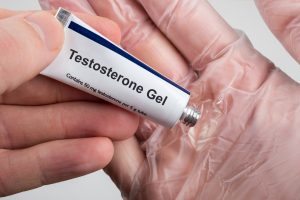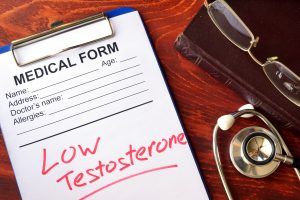As with so many other harmful drugs, the use of testosterone went off the rails when companies pushed the drug’s use for off-label purposes. Although testosterone replacement therapy was approved to treat just two specific conditions, companies eventually pushed their products to treat all kinds of other conditions, uses never approved by the FDA. According to the Third Amended Master Long-Form Complaint filed in the testosterone multi-district litigation (MDL 2545), it was this aggressive off-label marketing and label-expansion that led to many unnecessary injuries, suffering, and thousands of lawsuits.
FDA Approves Testosterone For Treatment of Two Conditions
In 1953 the FDA first approved a version of synthetic testosterone to treat two conditions: (1) primary hypogonadism and (2) hypogonadotropic hypogonadism. Since that time the FDA has not approved testosterone to treat any other diseases or conditions.
- Primary hypogonadism
This is a condition where the man’s testicles fail to function in certain important ways. Specifically, the man’s body fails to produce sufficient amounts of testosterone. Primary hypogonadism can occur in childhood or later in life. If it happens in childhood, the child may not fully develop sex organs, may not grow body hair, and may fail to move normally through puberty. If hypogonadism occurs in adulthood, the man may suffer from erectile dysfunction, infertility, decreased body hair and muscle mass, loss of bone mass or density, and other problems. The FDA noted that primary hypogonadism may be specifically caused by undescended testicles, rotated or twisted testicles, inflammation in the testicles (orchitis), surgical removal of a testicle, or vanishing testicles. (And yes, it pained me to write out that list.)
- Hypogonadotropic hypogonadism
This is a form of hypogonadism which is caused by a problem with the pituitary gland or the hypothalamus (a part of the brain that regulates the pituitary gland and other bodily functions). Basically, hypogonadotropic hypogonadism (let’s call it HH) occurs when a lack of hormones fails to activate the testicles, and thus little or no sex hormones are released. HH can be caused by damage to the pituitary gland or to the hypothalamus from injury, surgery, tumor, infection, or radiation. It can also be caused by genetic defects, chronic disease, drug abuse, nutrition problems, or even stress. The symptoms of HH are like those of primary hypogonadism.
Over the years the FDA approved many different testosterone products for use to treat these two conditions. But only these two conditions. The FDA never approved the use of testosterone for use to treat erectile dysfunction, low energy, depression, lack of sexual interest, “Low-T,” or any other condition unless it was a diagnosed symptom of the two types of hypogonadism discussed above.
The business problem for the companies selling these products is that the population of men suffering from hypogonadism is not significant. The population of men suffering from low sex drive, low energy, loss of muscle mass, or erectile dysfunction, however, is much, much larger. Find a way to sell to that larger group and these companies can make much more money.
Aggressive Off-Label Marketing and Label Expansion
According to the Master Complaint (MDL 2545), companies marketed testosterone for off-label use. In addition, the companies are alleged to have exploited ambiguities in the product labeling to expand the permitted uses for testosterone beyond treatment of hypogonadism.
According to the Complaint, drug manufacturers attempted to blur the lines between hypogonadism and a condition referred to as “Low-T.” Many people have heard of the term Low-T, but it does not actually appear to be a condition recognized by the scientific or medical community. The Master Complaint alleges that AbbVie, Inc., maker of the testosterone product “Androgel,” represented that Low-T was an “acquired form of hypogonadism.” Low-T (whatever it is) is not the same as hypogonadism, and therefore use of testosterone to treat Low-T is an off-label and unapproved use. Other testosterone makers–including Eli Lilly, Endo, Auxilium, Pfizer, and Actavis–also pushed off-label uses and blurred the lines between hypogonadism and other conditions. This effort by the drug companies was intended to expand the reach of the approved uses for testosterone. The companies used ambiguities in the drug label to advocate for treatment of other conditions and thus sell much more of the product than it would if it were only sold to those men actually suffering from hypogonadism.
Once these connections were made, the target population of testosterone users expanded rapidly, from one million to five million and eventually up to twenty million men. Let me be very clear: twenty million men do not suffer from hypogonadism. Rather, as the years marched along more men without a diagnosis of hypogonadism but who may have suffered from an isolated condition such as low energy or reduced sex drive may have been prescribed testosterone. This medication is very potent and comes with significant risks and potentially nasty side effects (such as heart attacks, stroke, and blood clots), and it should be taken only if there is a serious underlying condition such as hypogonadism.
If you have taken testosterone, or otherwise have interest in this subject, I encourage you to read the Amended Master Complaint in the testosterone MDL. If you have suffered an injury after taking testosterone, call me.
Note: This post was written after review of court filings and news reports. Please note that the makers of testosterone dispute some of the points made in the Master Complaint and in this article.
 North Carolina Product Liability Lawyer Blog
North Carolina Product Liability Lawyer Blog



